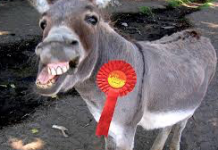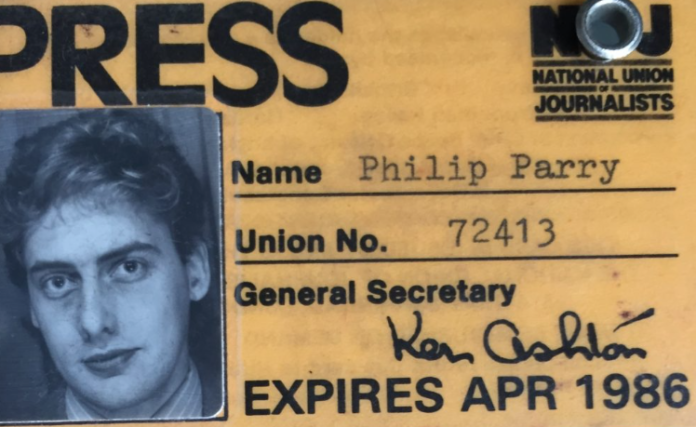- Another letter of the law - 2nd May 2024
- Shopped - 1st May 2024
- Postal order - 30th April 2024

Occasionally events confirm questions raised in a story on The Eye, and our journalists can congratulate themselves.
Two days after our story that a businessman who had taken over a troubled company which pulled out of Wales had dabbled in cannabis, and been investigated by a Sunday newspaper, came news of a very different, but no less alarming, sort.
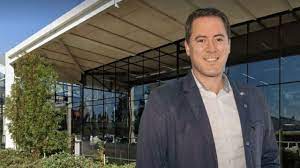
The police (in conjunction with the Serious Financial Crime Taskforce [SFCT]) swooped on the offices of Scale Facilitation (SF), and SaniteX (S) in Australia’s north Geelong on Friday. They are owned by contentious David Collard, who won the battle to take over controversial Britishvolt (BV).
Mr Collard’s Recharge Industries (RI), a subsidiary of SF, bought BV this year after it collapsed, but it is yet to pay for a prospective plant site near the Port of Blyth.
BV had said earlier that it would base itself in Wales yet ditched the plan, even though the then ‘Chief Executive’ Orral Nadjari claimed he had looked at more than 100 sites. There were allegations that staff at the offices which have been entered by the police went unpaid in recent weeks, and a spokesperson for the authorities which undertook the raid said they were acting on “multiple warrants” as part of “an investigation into alleged taxation fraud”.
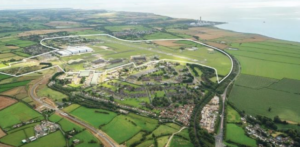
Here, then, is our original story about Mr Collard and BV, which was published on Wednesday —
Disturbing news that a businessman taking over a company which pulled out of Wales had dabbled in cannabis, and been investigated by a Sunday newspaper, come after revelations about one of its original founders being a tax fraudster, yet The Eye were alone in raising major questions about the firm.
 David Collard is the subject of serious scrutiny now he has won the battle to take over the assets of controversial Britishvolt (BV), which said it would base itself in Wales but ditched the plan, even though the then ‘Chief Executive’ Orral Nadjari claimed he had looked at more than 100 sites.
David Collard is the subject of serious scrutiny now he has won the battle to take over the assets of controversial Britishvolt (BV), which said it would base itself in Wales but ditched the plan, even though the then ‘Chief Executive’ Orral Nadjari claimed he had looked at more than 100 sites.
Mr Nadjari uttered these reassuring words, as BV said originally that it had chosen a former RAF base in Bro Tathan near St Athan for its battery factory.

Perhaps, as with Mr Collard, the background of those involved at the time might have given onlookers cause for concern about this announcement.
Investigations by our journalists at Companies House (CH) and elsewhere, disclosed that a prominent director of BV then was Couroush (or Courosh) Alai who until recently lived in a modest apartment at Lily Street in Cardiff, which appeared to be a terraced house converted into flats.


The organisation’s original Chairman and co-founder, Lars Carlstrom, had been involved in a coach company at Coventry that was in debt to creditors for around £1 million.
He had also been director of a watch manufacturer called Thrupp and Maberly which has now been dissolved.
In 2011 it had first come to light that Mr Carlstrom was the “representative in Sweden“ of Vladimir Antonov who had been jailed for fraud. Mr Carlstrom was involved, too, in a sale and leaseback deal of property and plant belonging to the Swedish car maker Saab.

At an extradition hearing, the former ‘representative’ of Mr Carlstrom, Russian-born Mr Antonov, who once owned Portsmouth FC, said that the charges against him were part of a politically-motivated plot. Mr Antonov, whose father was shot and injured in Russia in 2009 over a suspected business dispute, claimed that he was at risk of attack in prison if he was sent abroad to stand trial.
He was also handed a four-year trading ban in the late 1990s, and later, too, was accused of acting negligently by Sweden’s tax authority over a separate unpaid bill for one of his companies in 2011. In leaving BV, Mr Carlstrom said: “I don’t wish to become a distraction”.

After Mr Antonov’s conviction, BV’s Chief Strategy Officer, Isobel Sheldon, said the operation was severing all ties with him.
Meanwhile before the announcement that the new plant would be built in Northumberland as opposed to South Wales, Mr Nadjari had declared brazenly: “The first UK gigaplant will… be in an alternative location (to South Wales) which we will be announcing soon”. But even this was not to be, because BV then went belly-up altogether.
The past of Australian Mr Collard, too, some may think questionable.
Although they do not appear on his website, he registered two cannabis brands in Australia, one called Cannabis Collective, with another entitled Australia Weed Co, and a third, Smoko, for a further possible venture.


Mr Collard, who comes from Geelong, was investigated by the Sunday Times (ST), which painted a picture of a man who was long on ambition, but possibly short on experience for an executive who wanted to spend billions of dollars building gigafactories.
However this sort of information appears to fit BV’s worrying past – despite its supposed launch in Wales being warmly welcomed by senior politicians and the mainstream media.
For example, the former Secretary of State for Wales, Simon Hart MP, said it was “fantastic that we can talk about Wales as being a leading contender” for the UK’s first gigafactory.
Colleagues of Mr Hart, who were even more important, also backed the company. BV was once touted by one-time Prime Minister Boris Johnson as a key part of his green industrial revolution, but its £4 billion project in the North East of England (after plumping for a site there instead of one in South Wales) came close to collapse more than two years ago.
 Most of the media (apart from The Eye), also joined in with the hoopla when BV was supposedly coming to Wales. BBC Cymru Wales (BBC CW) declared: “The firm behind a proposed battery factory which could create 4,000 jobs has listed a site in Wales as its ‘preferred option’”. The website WalesOnline (WO) published: “Plans for a giant factory and thousands of jobs for the Vale of Glamorgan have been revealed. Battery manufacturer Britishvolt announced … that two sites are in the running for their factory, with Bro Tathan business park (near St Athan) leading the way”. It stated later: “Plans for a factory producing electric car batteries that would bring thousands of jobs for the Vale of Glamorgan have moved a step closer.”.
Most of the media (apart from The Eye), also joined in with the hoopla when BV was supposedly coming to Wales. BBC Cymru Wales (BBC CW) declared: “The firm behind a proposed battery factory which could create 4,000 jobs has listed a site in Wales as its ‘preferred option’”. The website WalesOnline (WO) published: “Plans for a giant factory and thousands of jobs for the Vale of Glamorgan have been revealed. Battery manufacturer Britishvolt announced … that two sites are in the running for their factory, with Bro Tathan business park (near St Athan) leading the way”. It stated later: “Plans for a factory producing electric car batteries that would bring thousands of jobs for the Vale of Glamorgan have moved a step closer.”.

This was The Times: “Ambitious plans have been revealed for Britain’s first gigafactory capable of producing enough fuel cells and battery packs to power 100,000 zero carbon electric cars. The project in south Wales, which is designed to put the UK in the race to be a global hub for the electrified vehicle industry, comes from Britishvolt, a start-up company founded by a Swedish automotive entrepreneur best known as a former associate of Vladimir Antonov, the jailed Russian businessman. Britishvolt has unveiled plans to build a gigafactory capable of producing 10 gigawatt hours (GWh) of lithium ion batteries a year from early next year at Bro Tathan, on the Cardiff airport commercial complex where Aston Martin Lagonda has opened its new carmaking factory.”

The scheme for South Wales, though, was soon stopped by BV, yet crucial facts about the men behind it could have been easily discovered. Perhaps emphasising what happened, our research could find no record of any director having a background in battery manufacturing.
When BV pulled out of Wales there was widespread disappointment. For instance, Neil Moore, leader of Vale of Glamorgan council said: “They were given a better deal elsewhere. I was surprised when they pulled out”.

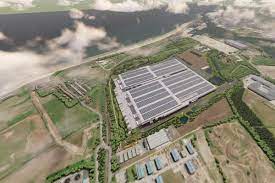
BV had apparently acquired the Blyth site over the Welsh alternative because of better connections to renewable power sources such as windfarms in the North Sea, as well as an interconnector to Norway’s hydroelectric power – with timing difficulties in Wales also allegedly a factor.
Others, though, thought different issues were at work, and in the way the news of the ‘alternative location’ (Blyth) was welcomed, there would seem to be an uncanny echo of what happened in South Wales.
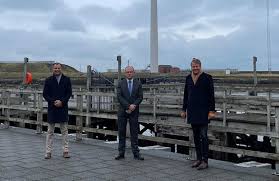
The Blyth Valley MP, Ian Levy, stated at the time: “This is an incredibly exciting announcement that will have a massive impact in the constituency and the surrounding area for decades to come”. Unfortunately there would be no massive impact for the area or for anywhere else, because BV soon went bust.
In the ST it was published: “Britishvolt’s inevitable journey towards disaster has been, well, a very British story…The electric car battery factory planned for Blyth, near Newcastle, had no customers and no products. One of its founders had no automotive experience. The other had a conviction for tax fraud in the 1990s. Britishvolt wanted millions of taxpayers’ pounds for its gigafactory”.
 As this report alludes to, the UK Government had committed a total of £100 million worth of taxpayers’ money to BV for the project, and it is understood the firm wanted to draw down nearly a third of the funding early, but officials refused.
As this report alludes to, the UK Government had committed a total of £100 million worth of taxpayers’ money to BV for the project, and it is understood the firm wanted to draw down nearly a third of the funding early, but officials refused.
With this sort of background, the recent information about the man taking over BV came as no surprise to critics of the scheme online, and as the website North East Bylines (NEB) had put it about Mr Carlstrom earlier: “He was the same individual whose track record had been queried by The Eye when reviewing the proposed location in Wales in July last year, and who seems still to be a major shareholder”.
 But as the report showed, our research featured in publications in the North East of England after the firm had proclaimed that it would not, after all, build the St Athan plant in the Vale of Glamorgan and move to Blyth instead.
But as the report showed, our research featured in publications in the North East of England after the firm had proclaimed that it would not, after all, build the St Athan plant in the Vale of Glamorgan and move to Blyth instead.

The website said: “In July 2020 this (the plans for the battery factory) seemed a welcome bonus for Wales and the prospects of a large new green manufacturing capability with thousands of jobs could only be good news. Except, however, when doubts were quietly raised by The Eye, an investigative news and journalism website ‘looking into misdemeanours by organisations and individuals in Wales and the UK’”.
There is other worrying news now (that a businessman taking over a company which pulled out of Wales had dabbled in cannabis, and been investigated by a Sunday newspaper), so it may not help a firm which had an original founder who was a tax fraudster, when The Eye had been alone in posing important questions about his organisation…

— It seems that today there are even more questions, after police raided the offices of that businessman who had taken over the company which scrapped the Welsh plans amid a cloud of controversy.
Sometimes stories on The Eye can serve a purpose…
The memories of our Editor, Welshman Phil Parry’s astonishing 39 year long award-winning career in journalism when the interesting backgrounds of individuals were uncovered, as he was gripped by the rare neurological condition Hereditary Spastic Paraplegia (HSP), have been released in a major book ‘A GOOD STORY’. Order the book now!

Regrettably publication of another book, however, was refused, because it was to have included names.
Also on The Eye – reporting political shenanigans to gain votes has long been central for Phil, and now comes news that the autocratic ruler of Turkey Recep Erdogan, could be reversing an unorthodox widely-condemned economic policy, which he may have used purely to secure re-election.
Tomorrow – he looks at how the careful choice of words has always been vital for him, and this has now been put centre stage by the huge storm which followed the Bank of England (BoE) Chief Economist, Huw Pill, saying that people “need to accept” they are poorer and stop seeking pay increases, so pushing prices higher.







